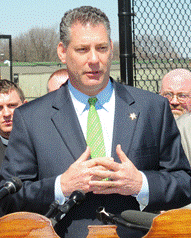Koutoujian: Healthy Teen Relationships Are a Matter of Safety
 By Peter J. Koutoujian, Middlesex Sheriff
By Peter J. Koutoujian, Middlesex Sheriff
For most of us, our teenage years were spent focusing on school, participating in sports or other extracurricular activities, spending time with friends and experiencing our first foray into the world of dating, a process itself that is changing into forms perhaps strange to modern parents. These relationships were one of the first rites of passage on our path to maturity – an important sign of independence, but fraught with inexperience and vulnerability. Today they are the same, but also involve new complications.
Teenagers today are no different from those of us who experienced both the elation and heart break of dating for the first time, one of the most devastating of human experiences for which we need to provide better training and support. Moreover, for young adults today there is a growing trend emerging that warrants the sad distinction of making February Teen Dating Violence Awareness Month.
Here in Middlesex County, we don’t have to look far for examples to show the seriousness of this problem which exists across our state and country. Allison Myrick of Groton, and Lauren Astley of Wayland, were two energetic, young women whose lives were cut short by former boyfriends in harrowing examples of teen dating violence. Three to four women a day similarly die in such relationships in our country.
New research released by the American Psychological Association in 2013 paints a stark picture with nearly 1-in-3 young people aged 14-20 reporting they had been involved in an abusive relationship. According to the Centers for Disease Control (CDC), victims of teen dating violence are more likely to do poorly in school and engage in binge drinking, suicide attempts, and violent behavior. The CDC study also cites that physically abused teens are three times more likely than their non-abused peers to experience violence during their subsequent years. Ultimately, this creates a troubling cycle of abuse that can negatively impact a victim without intervention and can be carried on through generations.
These statistics are stunning and should act as a call to action for us as a community to focus more attention on this issue not only as a public safety matter, but as a public health one as well. The best way to do that is to educate our teens on acceptable and effective relationship behaviors by serving as role models in our own lives, and by being determined to keep dialogue about effective relationships open with our children.
It is just as important that we educate ourselves and our teens on the red flags that can indicate they or their friends are in unhealthy relationships. That is why an open line of communication about the responsibilities and some of the difficulties that come with dating at a young age is so important. Some of those indicators include:
For potential victims:
– Unexplained bruises or marks
– Falling self-esteem
– Increased isolation from friends and family
– Change in appearance that has been dictated by a significant other
– Technology being used as a way to monitor another’s activities
– Signs of intense efforts to help fix the partner, to accept blame and to take too much responsibility for relationship problems.
For potential perpetrators:
– Low self esteem often covered with apparent charm or bravado
– Constant thinking about and intense preoccupation with a partner
– Outbursts of demanding behavior
– Jealousy and concern about betrayal
– Blame and criticism of others
– Tendencies to criticize and control a partner’s behavior
Dating can be an emotional rollercoaster no matter our age as we are all seeking dependable love, acceptance and companionship in our lives. We need to build the capacities in our youth to face the many normal rejections in life with resilience. I urge you to start a conversation with your teen – and have them check in with their friends — about how to avoid what may cause them harm now and in the future.
If you or they see any indicators of dating violence, please consult a professional at REACH Beyond Domestic Violence (www.reachma.org,) RESPOND, Inc. (www.respondinc.org) or one of the state’s other groups dedicated to helping victims of domestic violence.